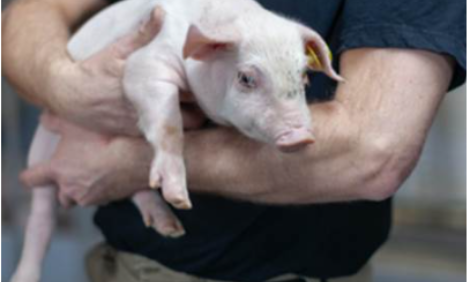



Basic principles of all in all out
By Northern Ireland Agricultural Research Institute - This article provides a basic guide to the principles of All-in, All-out. More detailed information is availible in our Pig Health Database area. Weight and age spread. The age and weight spread at weaning must be as tight
as possible. Pre-weaning nutrition and management must be aimed at maximising
the weaning weight of all piglets. The smaller runt piglets at weaning are often
carriers of disease. A decision must be taken whether to mix these piglets with
healthy ones, or to remove them to avoid bringing down the health status of the
whole group.
Weight and age spread. The age and weight spread at weaning must be as tight
as possible. Pre-weaning nutrition and management must be aimed at maximising
the weaning weight of all piglets. The smaller runt piglets at weaning are often
carriers of disease. A decision must be taken whether to mix these piglets with
healthy ones, or to remove them to avoid bringing down the health status of the
whole group.
Building fill time. Each time piglets are weaned they should be housed in separate rooms or buildings.
Single sources of piglets. If weaner pigs are purchased from a number of third parties, they ought to be housed separately. Each of the herds from which they originated will have different disease burdens.

Herd replacements. Replacement gilts should enter an isolation unit to enable blood tests to be carried out to ascertain their health status. When they enter the main unit they need to be housed in acclimatisation pens and slowly integrated into the main herd.
Cleaning. Thoroughly clean and disinfect rooms between batches, including feeders, comfort boards, fans etc. Recent work in Denmark showed the dramatic effects of totally cleaning a room compared with partially cleaning prior to occupation (Table 1).
Building design. Buildings should be sited as far apart as possible, ideally 100 m plus. This is often easier said than done. If buildings are in close proximity, ensure that air exhausted from one building is not drawn directly into another.
Management sequencing. Where pigs of different ages are on one site, the highest health pigs (the youngest) should be visited first each day. Foot dips should be provided at the entrance of each building and if the young stock have to be revisited, it should be done at the end of the day after the stockman has changed into clean overalls and boots.
Access to the Farm. Access must be limited. This includes people, vehicles and stock! Where people and vehicles must enter, make sure both are pig free, both are washed and people are provided with clean clothes and boots!
Table 1. The effect of a cleaning programme
| Part cleaned | Totally cleaned | Improvement | |
| Number of batches | 13 | 13 | |
| Start weight (kg) | 25.4 | 26.4 | 3.9% |
| Daily gain (g) | 693 | 744 | 7.4% |
| Treatment for respiratory diseases | 6.9 | 4.1 | 40.6% |
| Mortality (%) | 3.5 | 2.2 | 40.0% |
|
Source: NCPBHP, Denmark 1996 | |||
Further Information
For further more detailed information on All-in All-out principles can be found by either:BROWSING or SEARCHING our Pig Health Database








